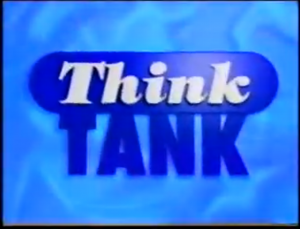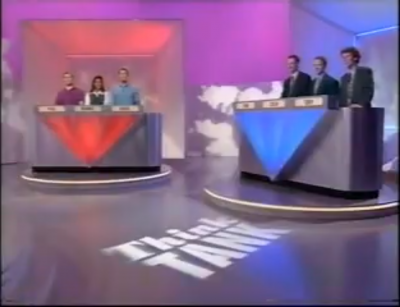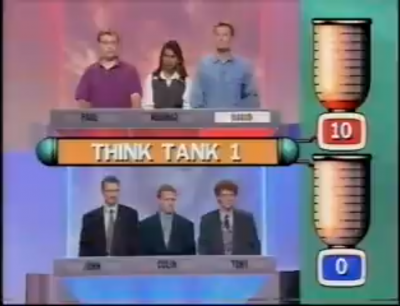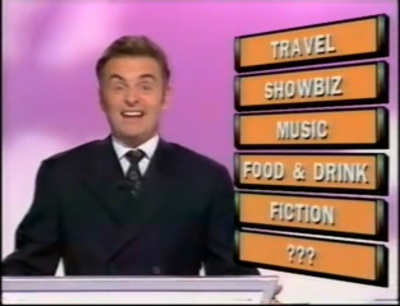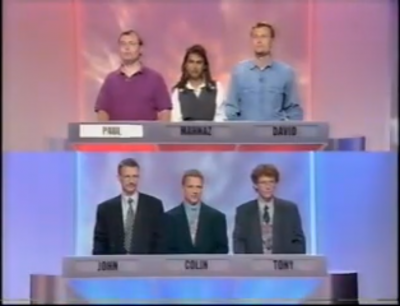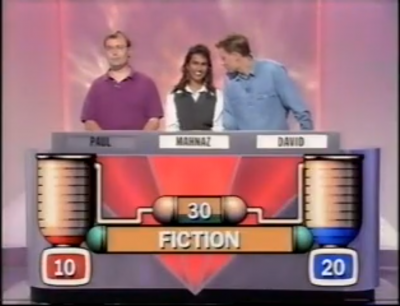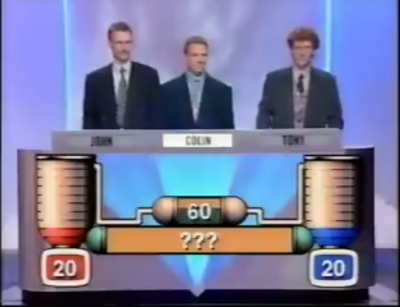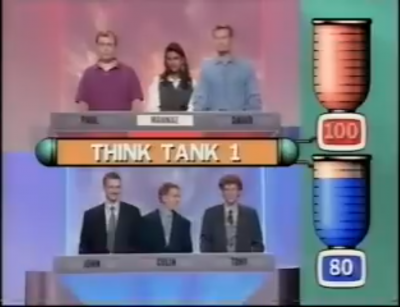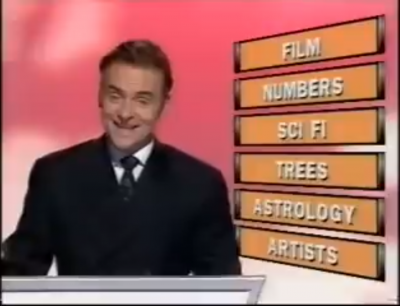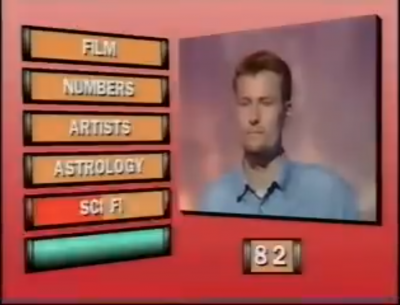Think Tank (2)
Contents |
Host
Co-hosts
John Sachs (announcer)
Broadcast
Action Time for Channel 4, 16 October to 22 December 1995 (50 episodes in 1 series)
Synopsis
Channel 4's 4.30pm slot is usually occupied by either Countdown or Fifteen-to-One, so they tried out a new quiz in the 4pm slot before we all flocked to the big guns and it turned out to be a really fun show.
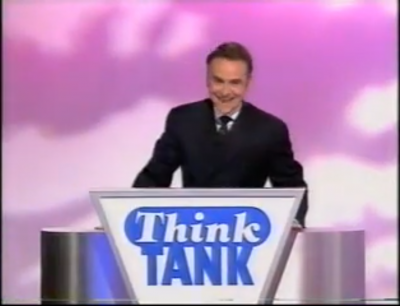 Mickey Hutton in a suit AND with short hair.
Mickey Hutton in a suit AND with short hair.The game is played by two teams of three contestants answering general knowledge questions in order to fill in a computer graphic board known as a 'Think Tank'.
Round 1 starts with a quickfire round, both teams get three think tanks, they have 30 seconds to buzz in and answer each question correctly to put 10 points into their first think tank, if they buzz in and answer incorrectly, the opposing team gets the chance to answer it correctly and add the 10 points into their first think tank. Once the 30 seconds is up, they move on to the second think tank and do the same thing as they did with the first with 30 seconds, and yes, the same goes with the third think tank.
We go onto Round 2 and this is where a series of six categories appear on the board, the team that is behind on points in one think tank gets to choose a category to put into that think tank, same goes with the second and third.
After they picked the categories to go into the think thanks, they will then have to answer a series of questions based on each category they've chosen, but in order for them to take control of that categorised think tank, they will have to buzz in and answer a general knowledge question correctly to qualify answering questions on that category.
Each contestant on the team that has control of that category has to answer a question based on that category question, they do have a 'Think Tank Session', which they can only use once to confer with their teammates. Each correct answer based on the category is worth 10 points and they are then asked if they want to freeze the points they got and add it to their think tank or play on for more. If one contestant gets an incorrect answer or doesn't answer in time, they are eliminated from play, if all three are eliminated then their opposing team gets the chance to steal all of their points they've accumulated based on correct answers and add it into their tank, if the opposing team gets it wrong or doesn't answer in time then the points go back to the eliminated team and are automatically added into their think tank. Repeat this for the other two categories in which they have to answer a question correctly in order to take control of that categorised think tank.
Round 3 is sort of the same as Round 2 but with two differences, the team that is trailing on one think tank can either keep the category that is in that think tank or they can change it for one of three categories on the board that hasn't been chosen, same applies with the second and third as well. Again, they have to answer a general knowledge question correctly to gain control of the category and each correct answer on the specific category is now worth 20 points.
At this point in the third round, it is possible to fill a think tank, the target is 100 points and the first team that fills two out of three think tanks wins the game and goes through to play the 'Think Tank Challenge'. If no team fills two think tanks after the third round, then a fourth round is played, which is basically the first round but without the 30 second time limit and each correct answer is now worth 30, which guarantees a filled think tank eventually.
In the finale, which is the Think Tank Challenge, various topics would be given to the winning team and they were allowed to order the subjects according to their personal preference.
Each question is a statement in which the last part is false (e.g. - Ian Brown is the lead singer of the Stone Daffodils) and each contestant in the winning team would then have to correct the last part of the statement to make it true (Correct answer: Stone Roses), for each correct answer, a chunk is added into the first tank, which requires one and the next tank requires one more correct answer to complete than the previous one. If the contestant in the team gets a wrong answer or passes then it goes over to the second contestant in that team, if the same happens to them it goes over to the third contestant and if none of them know, a new statement is read. If they can complete all of the tanks within 90 seconds, they won the grand prize of a CD player.
A really innovative show with a very enthusiastic host who really surprised us when he made the move from Hangar 17 to this. Well played Mickey. Shame the show went out at the same time as Today's the Day, which was dominating the slot's ratings on the other side. It's successor the following year Backdate, made by the same company as Think Tank, tried to replicate the Beeb's success and again didn't last very long. Channel 4 decided in September 1996 that Fifteen-to-One was to be the 4pm slot's permanent placement, leaving Think Tank in the dust. But it's not all bad news though, at the very start of 1996, Think Tank received an entire repeat run in the early hours of the morning at 6.35am, just before us beggars woke up with Cheggers on The Big Breakfast.
Key moments
In the Think Tank Challenge round, Kevin Ashman, with a completely straight face (and as a result, hilariously), correctly responded "virgin" to the question: "Queen Elizabeth the First famously died a sturgeon".
Inventor
Stephen Radosh
Theme music
Simon Webb

